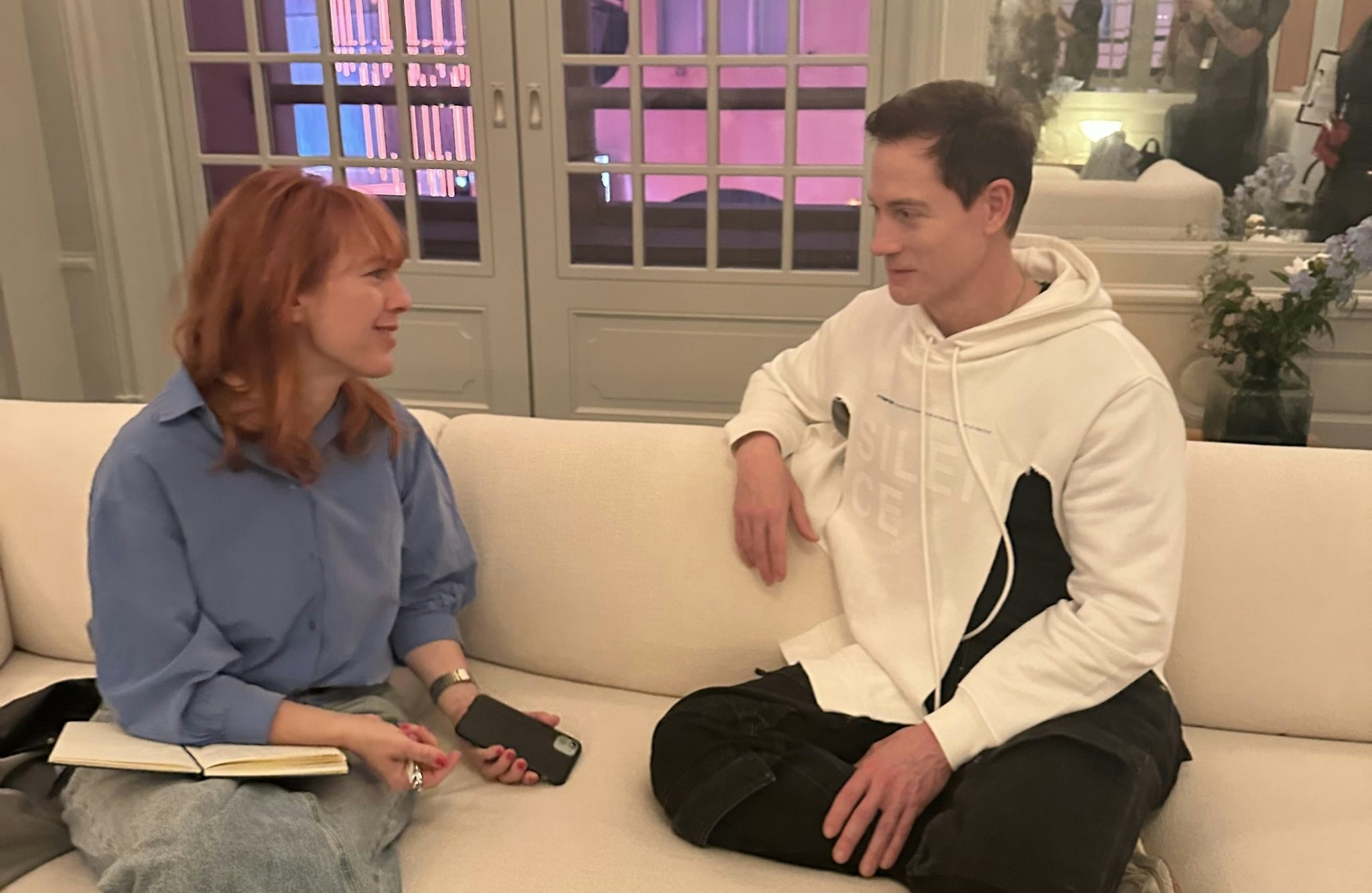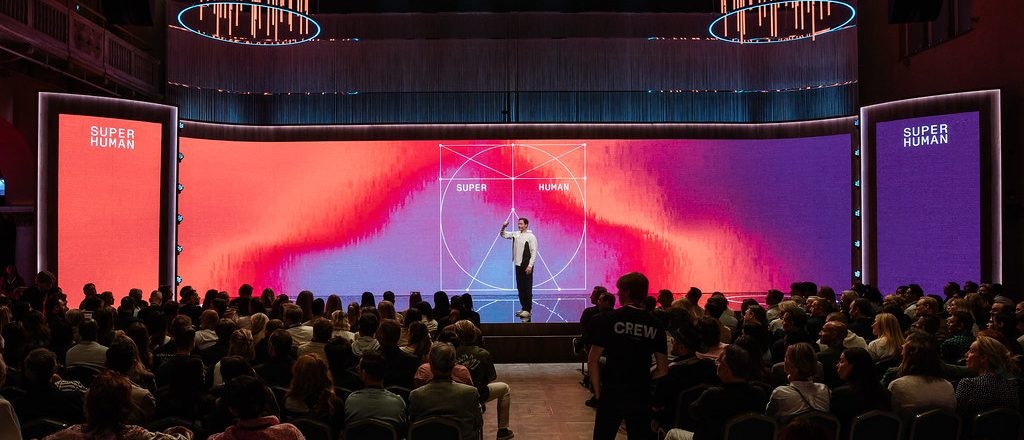“This is a spiritual movement. ‘Don’t die’ is a new ideological framework,” Bryan Johnson exclaimed from the stage at the Super Human Summit in Stockholm last weekend.
The 47-year-old is not just a household name for people into longevity, he’s also kind of a messiah. “It’s not really about health. What I’ve been trying to do is to give birth to a new movement, and we are now in the age of ‘Don’t die’,” he told the audience. “That is why I’m so weird. Don’t die is already here, and I’m the first model.”
Johnson hasn’t always been like this. He was born into the Mormon religion in Idaho and got married with three children. But he left the religion a decade or so ago after a depressive period, forced to leave his family behind, and seems to have found his new calling in one way or another — and if we trust him, this one seems to make him much happier.
His lifestyle of only eating what is good for him and nothing that will add a smidgen of fat on his body, taking over a hundred tablets each day, rigorous exercise and constantly doing health and blood tests, is often questioned by journalists and others. Is it sustainable — and how happy can you actually be living that way?
“I’ve never been happier,” he told the audience.
The $800m exit
Before turning to longevity, in 2007, Johnson founded the fintech company Braintree, which developed a payment system for e-commerce companies and raised a total of $69m from investors including NEA and Accel, according to Crunchbase data.
In 2013, PayPal bought it for $800m in an all-cash deal, and Johnson decided to put aside $100m for so-called “futuristic projects,” one of which is his own ‘Project Blueprint’ — which sees him spend millions of dollars in pursuit of ageing 0.69 biological years every year.
According to Johnson, all humans engage in self-destructive behaviours such as eating too much and the wrong kinds of food, drinking excess alcohol and taking other substances, not sleeping enough and many other forms of behaviour that accelerate disease and ageing.
Johnson’s objective with Blueprint was to eliminate these self-destructive behaviours.
A grifter or a world changer?
His website, however, looks more like a site selling a huge selection of longevity supplements rather than the website of someone spearheading a “spiritual movement”. From a mushroom powder called “Super Shrooms” — an alternative to coffee — to a longevity mix, a powder to mix with water to create a pink drink, both were readily available for anyone who cared to try them at the event.
With all the supplements, combined with the merchandise available online, some have accused Johnson of being a scammer, even comparing him to Elizabeth Holmes, the entrepreneur behind Theranos. But he takes the criticism in stride.
“So people think that hate or criticism is somehow bad or negative,” he tells me. “It’s not. It’s energy. So I welcome the criticism, and I very much lean into it and embrace it.” But, he adds that “when your trust is undermined, that’s bad.”
When getting up close to him in the green room at the event, even for the short duration of our interview, you can see that his skin is different from that of most men in their 40s. Maybe it’s the lifestyle, or all the treatments he’s had, that make it look more doll-like.
But is he a grifter?
According to Johnson, part of the criticism against him is because he has reached a level of power and status in society, and “those vectors of attack are very predictable,” he says. “Then there’s a presumption that making money is bad.
“I don’t have to defend myself. I’m an entrepreneur and a free citizen of the world. I build things, I create things and I’ve actually made longevity lower cost and easier to do than anyone in the entire world.”

Johnson has previously been injected with stem cells from Swedish startup Cellcolabs, a company that offers treatments in the Bahamas, and the startup could ride on Johnson’s popularity as he announced it on social media.
“Bryan has played an important role in bringing longevity into the mainstream, turning what was once a niche topic into something the wider public is now curious about,” Mattias Bernow, CEO of Cellcolabs, tells me.
“When we meet people who’ve found us through his channels, it’s clear they’re well-informed. That kind of awareness really matters, especially in a space where misinformation and low-quality products are still common.”
When I ask Johnson how much revenue Blueprint makes from its supplements, he doesn’t want to give a number.
“It’s enough to break even. If I was really trying to make money, I would not be making food and supplements. Really, I am an experienced entrepreneur. I could choose industries that make me so much more money than what I’m doing now.”
From 996 to 811
While he was building Braintree, Johnson framed life around work and it wasn’t until he got into longevity that he realised that his focus had been wrong.
So he’s well aware of the 996 movement — working 9am-9pm six days per week — which of late has divided much of the European tech world. “I guess the whole frame reveals that as a society, we’re obsessed with work. I would reframe it and say sleep is the most important requirement in this equation,” he says.
“I would do something like 811, where it would be eight hours of sleep, one hour of exercise and maybe like 30 minutes of meditation or breath work.
“When you’re an entrepreneur, it’s all about how you can brag about how little you sleep, how much you work and your growth numbers in your company,” Johnson says, adding that he sees a shift away from that, which is most prominent in his healthtech circles.
“The culture has shifted where entrepreneurs are bragging about their sleep scores and their biomarkers. People realise that taking care of their health is a high ROI activity.
“You will get better results if you sleep. For the longest time, we have imagined that no sleep is the highest yield activity. It’s crazy when really, sleep is the best performance-enhancing drug,” he says.

In an interview with Swedish media outlet Breakit last week, Johnson mentioned that he was a close friend of Spotify founder Daniel Ek. That the tech ecosystem is increasingly interested in longevity is a natural process, according to Johnson.
“Longevity is hugely the next obsession after building a company,” he says.
“Entrepreneurs understand that their body is their highest-value asset. And when you’re in your 20s, you feel like your asset can produce dividends for infinite time. When you get into your 30s and 40s and you’ve ground yourself down, I think they realise their asset is depreciating faster than they thought — and that means the end of one’s career.
“By rebuilding their asset base, they can reimagine what they can do. So it’s just finance. It’s compounded returns. It’s the K-curves. It’s a very quantitative, numerical assessment,” he says.
Big business
Being Bryan Johnson is a full-time job — not just making sure you eat the right things, exercise and sleep eight hours a night. It’s also about sharing everything that you do constantly.
When talking to people within the healthtech or longevity ecosystem, Johnson is perceived as a marketing genius. People are following his every move on social media, and he has content running on every possible channel — and manages this with only five hours of screen time a day, he says.
As the trend of founder focus grows when it comes to the marketing of startups, Johnson is a perfect example. Few would buy into Blueprint if it wasn’t if Bryan Johnson wasn’t behind it. Johnson believes that the rise in founder-centric marketing has to do with the loss of trust in others.
“As people distrust media and institutions more, there’s a vacancy of trust. So, who do [you] trust? That largely falls on individuals who build brands of trust. And so there’s just been a big opening in the world where people want a source of authority,” he says.
“When somebody’s trying to figure out what to do for their health in the US, they’re not turning to the CDC (the government Centers for Disease Control and Prevention), they’re turning to me. Like, tell me how to sleep. And so I’m a stand-in for a lot of people on how they see authority in life.”
Read the orginal article: https://sifted.eu/articles/big-interview-longevity-bryan-johnson/


